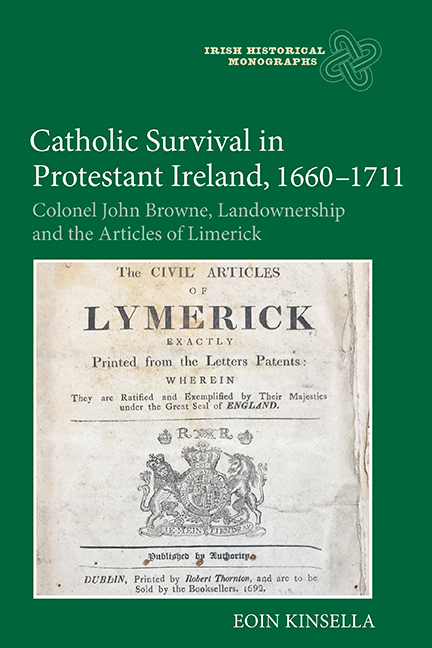 Catholic Survival in Protestant Ireland, 1660–1711
Catholic Survival in Protestant Ireland, 1660–1711 Book contents
- Frontmatter
- Dedication
- Contents
- List of Illustrations
- Acknowledgements
- List of Abbreviations
- Editorial Note
- Glossary
- Introduction
- Part I The Rise and Fall of the ‘New Interest’
- 1 ‘I hope all will end well with our New Interests’: The rise and fall of a ‘new interest’ landowner, 1666–89
- 2 ‘You must engage your plate, your credit, and all is at stake’: Jacobite colonel, ironmaster and negotiator, 1689–91
- Part II The Articles of Surrender
- Part III Article 13 of Limerick
- Conclusion
- Appendix A Articles of Surrender, 1690–91
- Appendix B Hearings scheduled for adjudication under the articles of Limerick, 1694
- Appendix C Proclamations of 7 July & 1 August 1691; ‘A copy of and answers to several complaints made by the Irish by their agent Mr Cockly’
- Bibliography
- Index
2 - ‘You must engage your plate, your credit, and all is at stake’: Jacobite colonel, ironmaster and negotiator, 1689–91
from Part I - The Rise and Fall of the ‘New Interest’
Published online by Cambridge University Press: 28 June 2018
- Frontmatter
- Dedication
- Contents
- List of Illustrations
- Acknowledgements
- List of Abbreviations
- Editorial Note
- Glossary
- Introduction
- Part I The Rise and Fall of the ‘New Interest’
- 1 ‘I hope all will end well with our New Interests’: The rise and fall of a ‘new interest’ landowner, 1666–89
- 2 ‘You must engage your plate, your credit, and all is at stake’: Jacobite colonel, ironmaster and negotiator, 1689–91
- Part II The Articles of Surrender
- Part III Article 13 of Limerick
- Conclusion
- Appendix A Articles of Surrender, 1690–91
- Appendix B Hearings scheduled for adjudication under the articles of Limerick, 1694
- Appendix C Proclamations of 7 July & 1 August 1691; ‘A copy of and answers to several complaints made by the Irish by their agent Mr Cockly’
- Bibliography
- Index
Summary
The 1689 parliament and its legislative achievements represented the high point of the brief Catholic resurgence of James II's reign. The time and space necessary to implement the new Catholic polity's programme of reform could only be afforded by the restoration of James II to the throne. Following William and Mary's coronation in London as king and queen of England, Scotland and Ireland in April 1689, it became increasingly clear that an invasion of Ireland was imminent. Much to the frustration of Irish Protestants sheltering in England, preparations for that invasion took longer than anticipated and it was not until August 1689 that Williamite forces landed at Bangor Bay, under the command of the duke of Schomberg. The war of the two kings had commenced, and the future of the Catholic counter-revolution hung in the balance.
This chapter provides a fresh analysis of the Jacobite war effort up to and including the negotiation of the articles of Limerick, the terms of surrender signed in October 1691 that brought the war to an end. As the owner of substantial ironworks in the west of Ireland, John Browne became increasingly important as a supplier of raw iron, tools and weaponry to the Jacobite army. Though relations between the Jacobite administration and Browne were strained throughout 1690, his importance to the war effort and his legal expertise led to his inclusion in the commission appointed to negotiate a Jacobite surrender in September 1691. Conscious of his still dire financial position, Browne took full advantage of the negotiations to spread liability for his personal debts to every Catholic landowner in Ireland.
Irish Jacobite preparations for a possible invasion from England began in earnest in December 1688, when Tyrconnell issued commissions for raising 50,000 men. Tyrconnell's aims were overly ambitious on several fronts, not least of which was the near impossibility of moulding such a large body of inexperienced men, for the most part commanded by wholly unqualified officers, into a functioning, disciplined army. Realising the logistical challenges that his actions had presented, Tyrconnell sought to reduce the Jacobite army to more manageable proportions throughout the first months of 1689, causing friction with the newly commissioned officers.
- Type
- Chapter
- Information
- Catholic Survival in Protestant Ireland, 1660–1711Colonel John Browne, Landownership and the Articles of Limerick, pp. 41 - 62Publisher: Boydell & BrewerPrint publication year: 2018
